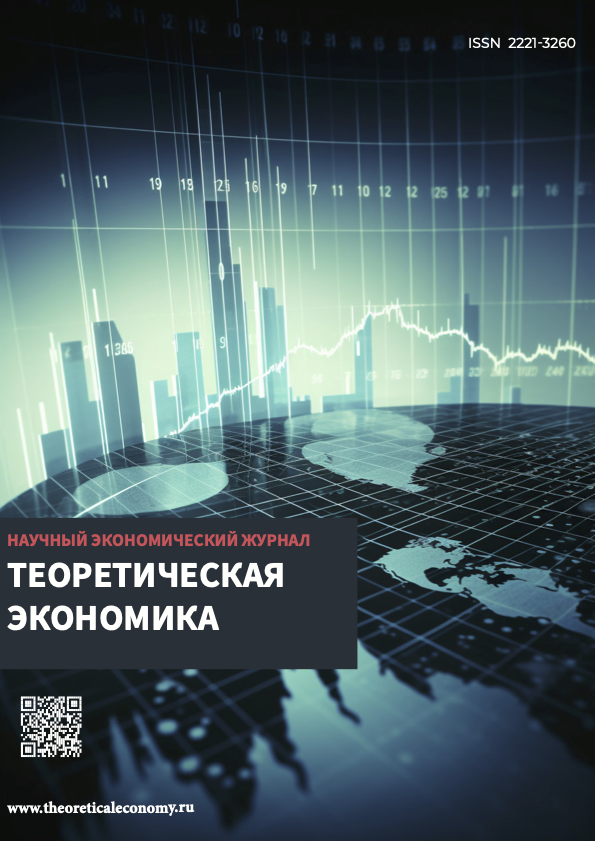Yaroslavl', Russian Federation
Yaroslavl', Russian Federation
Integration processes generate the so-called «spillover effects» that affect the welfare of the population of the countries involved in integration processes. The aim of the study is to assess the impact of technological spillover effects of integration on the welfare of the population of the EAEU member countries. The hypothesis of the study is that there should be a direct (statistically significant) relationship between the level of technological development in Russia and the welfare of the population in the other EAEU member countries. In the conditions of open borders in the EAEU space, knowledge, experience and technologies from the Russian economy (through the «technological spillover») will spread to the Union States, increasing the welfare of the population there. Correlation analysis was used to test the hypothesis put forward in the paper. As a result of the study, the hypothesis put forward in the paper was not confirmed by the data characterizing the economy of the EAEU member countries in the long- term time interval. The data analysis showed that the level of technology development in Russia is not related to the indicators characterizing the welfare of the population in the EAEU countries.
technologies, spillover effects, correlation analysis, population welfare, EAEU, Global Innovation Index.
1. Salera, V. (1951). The Customs Union Issue. Jacob Viner. Journal of Political Economy, 59(1), 84–84. https://doi.org/10.1086/257042
2. Yano, G., & Shiraishi, M. (2022). Innovation Spillovers between Domestic Firms in China. Emerging Markets Finance and Trade, 58(4), 1042–1060. https://doi.org/10.1080/1540496X.2021.1926978
3. Firsova, A.A., Makarova, E.L. (2017). Faktory, vliyayuschie na innovacionnoe razvitie regiona. Izv. Sarat. un-ta. Nov. ser. Ser. Ekonomika. Upravlenie. Pravo. 17 (2). 141–147. DOI:https://doi.org/10.18500/1994-2540-2017-17-2-141-147
4. Hájek, P., & Stejskal, J. (2018). R & D cooperation and knowledge spillover effects for sustainable business innovation in the chemical industry. Sustainability (Switzerland), 10(4). https://doi.org/10.3390/ su10041064
5. Yan, Y., & Wu, Z. (2020). Regional innovation distribution and its dynamic evolution: Policy impact and spillover effect-Based on the perspective of innovation motivation. PLoS ONE, 15(7 July). https://doi. org/10.1371/journal.pone.0235828
6. Sugiharti, L., Yasin, M. Z., Purwono, R., Esquivias, M. A., & Pane, D. (2022). The FDI Spillover Effect on the Efficiency and Productivity of Manufacturing Firms: Its Implication on Open Innovation. Journal of Open Innovation: Technology, Market, and Complexity, 8(2). https://doi.org/10.3390/joitmc8020099
7. Darfo-Oduro, R. K. A., & Stejskal, J. (2022). FDI Spillover Channel and its Effect on Innovation. European Conference on Knowledge Management, 23(1), 289–296. https://doi.org/10.34190/eckm.23.1.328
8. Ogurcova, E.V., Tugusheva, R.R. i Firsova, A.A. (2019). Innovacionnye spillover-effekty informacionno-kommunikacionnyh tehnologiy v vysshem obrazovanii. Perspektivy nauki i obrazovaniya. 6(42). 409-421. doi:https://doi.org/10.32744/pse.2019.6.34
9. Bouallaga, L., & Ouanouki, A. lamin. (2023). Econometric study on the impact of digital technologies on GDP in Algeria. All Sciences Abstracts, 1(5), 2. https://doi.org/10.59287/as-abstracts.1350
10. Aleksandrova, A., & Khabib, M. D. (2022). The role of information and communication technologies in a country’s GDP: A comparative analysis between developed and developing economies. Economic and Political Studies, 10(1), 44–59. https://doi.org/10.1080/20954816.2021.2000559
11. Pradhan, R. P., Mallik, G., & Bagchi, T. P. (2018). Information communication technology (ICT) infrastructure and economic growth: A causality evinced by cross-country panel data. IIMB Management Review, 30(1), 91–103. https://doi.org/10.1016/j.iimb.2018.01.001
12. Mirzaei Abbasabadi, H., & Soleimani, M. (2021). Examining the effects of digital technology expansion on Unemployment: A cross-sectional investigation. Technology in Society, 64. https://doi. org/10.1016/j.techsoc.2020.101495
13. DAĞLI, İ. (2022). The Rise of Technology for the Future Labor Force: The Nexus between Technology and Unemployment in OECD Countries. Çalışma ve Toplum, 5(75), 2775–2794. https://doi.org/10.54752/ ct.1191460
14. Koropets, O. A., & Tukhtarova, E. K. (2021). The impact of advanced industry 4.0 technologies on unemployment in Russian regions. Economy of Regions, 17(1), 182–196. https://doi.org/10.17059/EKON. REG.2021-1-14
15. Saka, H., Orhan, M., Savaş, M. K., & Savaş Ökte, M. K. (2021). Empirics of technology and unemployment in advanced countries (1). Theoretical and Applied Economics (Vol. XXVIII, pp. 183–200).
16. Dian Saraswati, B., Maski, G., Kalug, D., & Kresna Sakti, R. (2020). Does Financial Technology Affect Income Inequality in Indonesia? KnE Social Sciences. https://doi.org/10.18502/kss.v4i7.6850
17. Mohd Daud, S. N., Ahmad, A. H., & Ngah, W. A. S. W. (2021). Financialization, digital technology and income inequality. Applied Economics Letters, 28(16), 1339–1343. https://doi.org/10.1080/13504851.2020.1808165
18. Zheng, J., & Wang, X. (2022). Impacts on human development index due to combinations of renewables and ICTs –new evidence from 26 countries. Renewable Energy, 191, 330–344. https://doi. org/10.1016/j.renene.2022.04.033
19. Pérez-Castro, M. Á., Mohamed-Maslouhi, M., & Montero-Alonso, M. Á. (2021). The digital divide and its impact on the development of Mediterranean countries. Technology in Society, 64. https://doi. org/10.1016/j.techsoc.2020.101452
20. Shkiotov, S.V., Mayorova, M.A. i Markin M.I. (2023). Tehnologicheskie spillover-effekty integracii na prostranstve EAES. Sovremennye tehnologii upravleniya. (104). URL: https://sovman. ru/issue/2023/2023-104
 This work is licensed under Creative Commons Attribution-NonCommercial-NoDerivatives 4.0 International
This work is licensed under Creative Commons Attribution-NonCommercial-NoDerivatives 4.0 International












